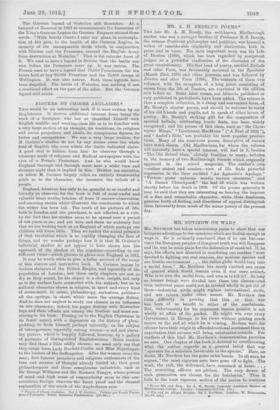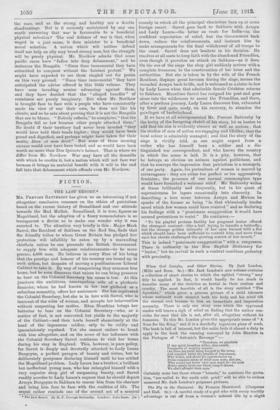MR. NOVIBOW ON WAR.f
Mn. NOVIHOW has taken unnecessary pains to show that war bringsno advantage to the countries which are foolish enough to wage it. He is evidently convinced that if he can but con- vince the European peoples of this great truth war will disappear and the way be made plain for the federation of mankind. If, he says, the efforts now directed to murdering one another "were devoted to fighting our real enemies, the noxious species and our hostile environment . . . the entire globe would turn into a model farm." Mr. Novikow has surely omitted one cause of quarrel which would remain even if war were extinct. Who is to own the model farm, and who is to till it P So long as human beings were divided into these two classes—and even universal peace could not be trusted wholly to get rid of them—industrial strife might. replace international strife, and war return under other names. Mr. Novikow has little difficulty in proving that this or that war has been of no benefit to either of the combatants. But, unfortunately for his argument, human passion is not wholly au. affair of the .pocket. He might win over every Government in Europe to his views without getting much nearer to the end at which he is aiming. Modern wars far oftener have their origin in offended national sentiment than in expectation that success will bring substantial rewards. For conflicts of this kind Mr. Novikow's demonstration provides no cure. One chapter of the book is devoted to overthrowing. what the author regards as a general belief that war " operates for a selection favourable to the species." Here, no doubt, Mr. Novikow has the game in his hands. In all wars, he argues, "time most vigorous men have gone off to fight. The weak, the sick, the deformed, have remained at home. . . . The recruiting officers are pitiless. The very flower of each generation are chosen for the butcheries." Thus it falls to the least vigorous section of the nation to continue • Poems Old and Now. By A. H. Beesly, formerly Assistant Master at Marlborough College. London Longmana and Co. [1o.] t War and its Alicgcd Benefits. By J. Novikow. London: W. Heinemann,
[2s. ed. net.] •
the race, and so the strong and healthy are a double disadvantage. But is it seriously maintained by any one worth answering that war is favourable to a beneficial physical selection? The real defence of war is that, when waged in a just cause, it does minister to a beneficial moral selection. A nation which will neither defend itself nor help an ally may breed strong men, but the strength will be purely physical. Mr. Novikow admits that some pacific races have "fallen into deep debasement," and he instances the Bengalis. "Since time immemorial they have submitted to conquest without the faintest protest." We might have expected to see them singled out for praise on this very ground. "Since time immemorial " they have anticipated the advice offered in this little volume. They have seen invading armies advancing against them, and they have decided that the "alleged benefits" of resistance are purely imaginary. But when Mr. Novikow is brought face to face with a people who have consistently Made his view of war their own, he does not like his clients, and so he sets about proving that it is not the Bengalis that are to blame. "Nobody reflects," he complains, "that the Bengalis fell so low because other people attacked them." No doubt if their territory had never been invaded "they would have held their heads higher ; they would have been proud and dignified, and perhaps might have taken for their motto, Dieu et mon droit." But none of these seeming virtues would ever have been tested, and so would have been worth no more than Don Quixote's helmet. That is where we differ from Mr. Novikow. War may have all the demerits with which he credits it, but a nation which will not face war because it brings no material benefit with it will in the end fall into that debasement which offends even Mr. Novikow.























































 Previous page
Previous page